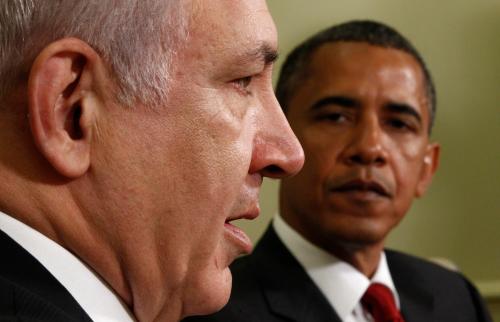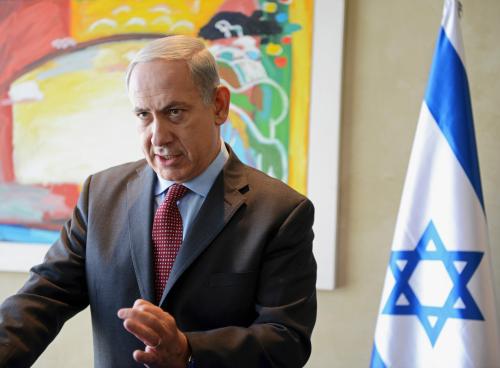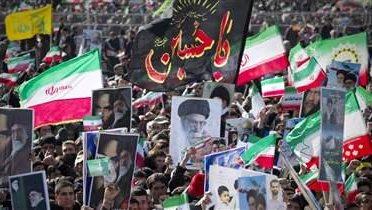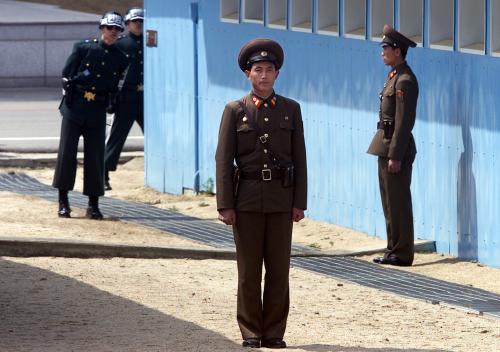In an address to the 10th annual Saban Forum, Israeli Prime Minister Benjamin Netanyahu sought to reinforce the longstanding American-Israeli partnership, which has been tested recently over differences between the two leaderships on the interim nuclear deal with Iran. However, in clear contrast to the perspective articulated by President Barack Obama to the same forum a day earlier, Netanyahu advocated ambitious terms for a final nuclear deal with Iran, including a requirement that Tehran change its policy toward Israel.
In contrast to his vociferous public criticism of last month’s Geneva accord between Iran and six world powers — which he called “a historic mistake” and “the deal of the century” for Iran — Netanyahu took pains to underscore his support for President Barack Obama and his government’s close cooperation with Washington on Iran as well as in the ongoing negotiations with the Palestinians. He echoed Obama’s references to the United States as the “indispensable nation,” and extended that to the bilateral relationship, calling the U.S.-Israeli partnership “the indispensable alliance” in meeting “the supreme challenge” to the world that is posed by Iran.
For the most part, Netanyahu pointedly avoided reiterating Israeli criticisms of the interim nuclear deal, which have centered around concerns about its failure to insist on a blanket suspension of Iran’s uranium enrichment activities as well as the fear that this preliminary step will effectively short-circuit pressure on Iran as well as any prospect for rolling back its nuclear program.
Instead, the prime minister focused the Iran segment of his speech on the issue of Iran’s stance toward Israel, noting Tehran’s refusal to recognize the Israeli state and highlighting its persistently vitriolic rhetoric toward the Israeli leadership. [For analysis and extended excerpts of one of the speeches that Prime Minister Netanyahu referenced, see my Iran@Saban post “As Nuclear Talks Inch Forward, Iran’s Supreme Leader Tacks Right With A Blistering Speech.”] Netanyahu insisted that any final nuclear deal with Iran must incorporate requirements that Tehran alter its stance toward Israel, explaining that:
“The Iranian regime’s pursuit of nuclear weapons makes these remarks more than a simple matter of sticks and stones. People tend to discount rhetoric from rogue regimes, from radical regimes. They said, well, it’s just talk. But talk has consequences. We’ve learned that in history. Especially when the regime that makes these statements is actually building the capability to carry it out. This same regime supplies its terrorist proxies — Hizbollah, Hamas, Islamic Jihad — with thousands of rockets, rockets that are aimed at Israeli civilians, rockets that are precision-guided munitions, that are increasingly lethal and deadly. This is a regime committed to our destruction.”
“And I believe there must be an unequivocal demand alongside the negotiations in Geneva for a change in Iranian policy. This must be part and parcel of the negotiations. In other words, I’m saying that what is required is not merely a shift and a diminution of Iran’s capability — an elimination of its capability to produce nuclear weapons — but also a demand to change its genocidal policy. That is the minimal thing that the international community must do when it’s negotiating with Iran.”
Notably, Netanyahu also endorsed the effort in Congress to intensify the sanctions even as the nuclear negotiations continue — measures that would attempt to slash Iran’s oil exports to nearly zero, an effort that the Obama administration is lobbying against in a public and strenuous fashion. [In an interview with TIME Magazine published subsequent to Netanyahu’s address, Iran’s foreign minister Mohammad Javad Zarif insisted that new sanctions would mean that “the entire deal is dead. We do not like to negotiate under duress.”] The Israeli prime minister argued that sanctions are responsible for Iran’s newly constructive approach to the nuclear talks, adding that: “(b)ecause of the pressure, what seemed impossible yesterday became possible today. We shouldn’t assume that more and tougher sanctions won’t lead to a better deal. What seemed, what seems impossible today could become possible tomorrow.”
The Israeli prime minister’s expansive requirements for a nuclear deal with Iran contrasted with the more tempered vision offered the previous day by President Obama, in a conversation with Forum Chairman Haim Saban before the same audience. Obama explicitly contended that a maximalist deal that ends all enrichment is not possible, explaining that “if we could create an option in which Iran eliminated every single nut and bolt of their nuclear program, and foreswore the possibility of ever having a nuclear program, and, for that matter, got rid of all its military capabilities, I would take it. But…that particular option is not available.”
The divergent expectations of the nuclear diplomacy correspond to a striking difference between the two leaders’ interpretations of Iran’s political dynamics expressed by both leaders in their dialogue with the Saban Forum. Obama argued that Iran’s election of a more moderate president in June 2013, and the diplomatic breakthroughs that have followed in its wake, demonstrate popular pressure for change and a better relationship with the world that Washington and the broader international community must test and further encourage through engagement. By contrast, the Israeli prime minister seemed to dismiss the recent developments in Iran as a change of style rather than substance, maintaining that:
“I think we’ve learned from history that regimes with unlimited appetites act out their fantasies and their mad ideologies when they think they have the weapons of mass death or at least incalculable power That’s what usually happens. Such power in the hands of such regimes unleashes the worst ambitions. It’s not that they don’t have diplomats, they do. They have diplomats. Some of them even wear ties – they might speak English and they might make PowerPoint presentations, while in the past they just spoke English. And they spoke reasonably well.”
“But when the power behind the throne, the power on the throne, is committed to a radical ideology and pursues it and talks about it again and again and again – then I say beware. We’ve learned in our experience, the experience of the Jewish people, to take seriously those who speak about our annihilation. And we will do, and I will do, what is necessary to protect the Jewish state and the future of the Jewish people.”
Although both the Israeli and American leaderships appear determined to move beyond the brief flurry of frictions articulated in the immediate aftermath of the Geneva deal with Iran, it seems almost inevitable that the differences in their views of Iran and their definitions of what constitutes an acceptable nuclear deal with Tehran will remain and will continue to complicate the prospects for a diplomatic resolution to the nuclear impasse with Iran.
As a practical matter, it seems unlikely that Netanyahu’s new demand for an end to Iranian invective against Israel will be incorporated into the already complex and cumbersome negotiations between Iran and the six world powers on the nuclear issue. The framework for this process exists specifically to mediate the most urgent aspect of Iran’s problematic policies, and it cannot support a steady expansion of its objectives just at the moment when progress finally appears possible. American interests in preventing Tehran from crossing the nuclear threshold require that we prioritize this issue above all others, recognizing that the array of concerns about Iran’s treatment of its citizens and its support for violent organizations across the Middle East will require an equally intensive diplomatic effort to amend.
Still, the concern should not go unnoticed by Tehran or by those who support diplomacy with Iran. As I wrote after a particularly vitriolic speech by Iran’s supreme leader last month, any durable diplomatic resolution of the crisis must entail an investment by both states in mutual threat reduction and reassurance. If the American head of state indulged in anything like the repeated anti-American diatribes that Ayatollah Ali Khamenei unleashes on a regular basis, Iranians across the political spectrum would be outraged, and such rhetoric would immediately torpedo any diplomatic progress on the nuclear issue or otherwise. Iran’s leadership must appreciate that neither their revolutionary antecedents nor their resource wealth exempts them from such censure. In the long run, if Iran wants a full return to the community of nations, its leaders will have to respect the norms of the civilized world.
The entirety of the Prime Minister’s address can be viewed here, and the Israeli and American press feature additional coverage of the speech, particularly its first half focusing on the U.S.-brokered effort to achieve a comprehensive agreement with the Palestinians.
- “US-Israel see most things ‘eye-to-eye,’ Netanyahu tells Saban Forum,” in the Times of Israel.
- “Netanyahu insists Iran can be forced to give up nuclear program,” by Paul Richter in the Los Angeles Times.
- “Israel Leader Urges New, Tough Terms in Iran Talks,” by Jay Solomon in the Wall Street Journal.
- “Netanyahu says recognition of Jewish state is ‘minimal requirement for peace’,” by Michael Wilner in the Jerusalem Post.










Commentary
Netanyahu Lauds “The Indispensable Alliance” And Raises The Bar For Iran Nuclear Talks
December 9, 2013